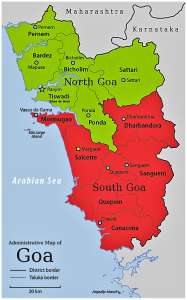A snapshot here of the structural design and current results of ‘Swastha Mahila Swastha Goa’ (SMSG) as a forward-looking, scalable and replicable project developed by the Yuvraj Singh Foundation (YSF) to conduct population level breast cancer screening of 100,000 age-eligible asymptomatic women across the state of Goa in India within two years. The uniqueness of the project lies in close looped implementation with partners to successfully develop a sustainable ‘Continuum of Care’ model from screening to treatment for breast cancer at national level
By Dr. Sumedha Kushwaha
Global Head- Strategy and Partnerships, Yuvraj Singh Foundation
Temerty Faculty of Medicine, Institute of Medical Sciences, University of Toronto
Swastha Mahila Swastha Goa: A Demonstration of Implementation Science
‘Swastha Mahila Swastha Goa’ (SMSG) literally translates to ‘Healthy Women Healthy Goa’. Amongst Indian states, Goa is smallest in terms of area; situated on the southwestern coast. According to 2011 Census, it has a population of 1.459 million people, with 62.17% of the population living in urban areas. The sex ratio is 973 females to 1,000 males.
Breast Cancer is the most prevalent cancer among women. 1 in 8 women in India contract the disease. Around 1,62,000 new cases are detected, every year which bring about 87,000 deaths every year. Unfortunately, 70% patients are detected at a late stage.
SMSG initiative was launched by the Yuvraj Singh Foundation (YSF) in partnership with SBI Foundation, Indian Institute of Banking and Finance, and the State Government of Goa. This program, was launched to provide free breast cancer screening facilities to 100,000 age eligible women in Goa with the help of iBreastExam (iBE). Developed by an Indo-US company UE LifeSciences, it is a low cost, battery powered, hand held, rapid diagnostic device for identification of breast abnormalities and early detection of breast cancer in a radiation free and non-invasive way.
YSF developed this unique project to conduct population level breast cancer screening of 100,000 age-eligible asymptomatic women across the state of Goa in India within two years. This project is a beautiful demonstration of understanding the ‘Positivity Rate’ for benign and malignant cases detected by iBE at a population level. It uses the principles of ‘Implementation Science’ to understand the dynamics involved in successful implementation of a health tech innovation at a mass level.
A multi-component strategy has to be employed when an innovation is tested not only for its clinical efficacy but also for its successful implementation, which involve a host of local and national factors are in-charge. The description, implementation and sustenance of such projects depends on the ‘Political Will’ to take up such an initiative, ‘Ease of use of Technology and its efficacy’, the ‘Adoption of technology and Skill Development’ of health workers and health professionals, ‘Acceptance and Motivation’ of patients to get themselves screened, and ‘Infrastructure and Facilities’ of the healthcare system. A major unseen factor is the management and administrative capabilities of the implementing agency like YSF in this case. Ancillary factors include adaptation of the program to local requirements, fidelity towards the project, cost effectiveness, penetration at population level, and mitigating challenges and barriers.
This project demonstrates the capabilities to strengthen existing infrastructure and manpower and through Capacity Building and Skill Development of Primary Health Care Workers. The uniqueness of the project lies in close looped implementation with partners to successfully develop a sustainable ‘Continuum of Care’ model from screening to treatment for breast cancer at national level. The data generated from this project can employ principles of ‘Knowledge Translation’ to recommend implementation of policy for a ‘National Breast Cancer Screening Program’ using iBE for women across the country.
The Indian state Goa, where this project is implemented is divided into North and South Goa districts. As a part of the project, staff nurses at Primary Health Centers (PHC) and Community Health Centers (CHC) across the state were trained to use the iBE device. Additionally, for successful implementation, 11 staff members were employed by the YSF.
Implementation science actually requires academic knowledge being translated into a research used for practical purposes. It is also a clear and unique style of project management which ensures success.
The staff in the project includes one ‘Project Lead’, an individual who overlooks at the entire project and coordinates with the Government, Funding Partners, Public and Private Organizations, Not for Profit Organizations, and the Foundation. Main duties involve being able to lead & motivate the project team to work towards achieving the organizational & project goals, take daily reporting from the Project Managers, ensure Daily/Weekly/Monthly scan targets met by the YWC Team & PHC/CHCs, and ensure all the project related assets are safe and secure. Technical Activities include troubleshooting device related queries for staff during screenings, organizing training for healthcare professionals at health centers on using iBE, maintaining inventory of the balance scan numbers in each device of your allocated region, and management of iBreastExam devices allocated under your assigned region
Under the Project Lead are two Project Managers, these are individuals responsible for each district separately- North and South Goa respectively. They are responsible for actively reaching out to Private Companies, NGOs, Government Organizations & other prospective partners and schedule Screening Camp keeping in mind the approximate number of beneficiaries. They would be responsible for assigning daily & weekly tasks and roles to Cluster Coordinators for the allocated Region and take Daily Reporting of the Cluster Coordinator of the allocated region, follow up with iBreastExam suspected cases, contact and collect the medical updates and reports of the suspected cases, contacting, counseling and handholding of the positive cases and maintaining their medical records.
Under these project managers are Cluster Coordinators, eight in number, four in each district, these staff members are always on the ground- responsible for conducting awareness sessions on Breast Cancer Screening followed by Question & Answer round, distributing the Information, Education and Communications material to the beneficiaries, conducting breast cancer screening following all COVID-19 precautions and protocols, ensuring proper usage of iBE devices, reports being mailed to Reporting Manager and to collecting all consent forms & data collection forms.
Through the collaborative effort of the Honorable Health Minister’s Office, ample support of the doctors working in the Ministry of Health and Family Welfare at State level, Government Hospitals, Medical Colleges, PHC doctors and staff nurses and the YSF Team- Within six months of its launch, a total of 14,316 scans have been conducted by a staff of 9 health workers at 35 Health Centers and at more than 120 outreach camps. 54 patients have been detected of benign lesions, 9 patients were positive for malignancies, undergoing treatment. iBE Suspected cases are referred to the Community Health Centres or Government Medical College, Goa for further investigation like a Breast Sonography or Mammography, as suggested by doctors free of cost. If the patient is found positive for a benign lesion they are advised prescribed conservative medical treatment. If a patient is diagnosed of a malignancy, they undergo surgical intervention and chemotherapy as prescribed by the Oncologist; both free of cost.
Such projects are examples of sustainable, scalable and replicable models which can be used across the nation; even countries for delivering a high level national breast cancer screening program at the population level.
—————————-
On (By) the same Author on PEAH
PEAH Interviews ATTAC – Aim to Terminate Tobacco And Cancer – Society
iBreastExam for Breast Cancer Detection in Low Resource Settings

